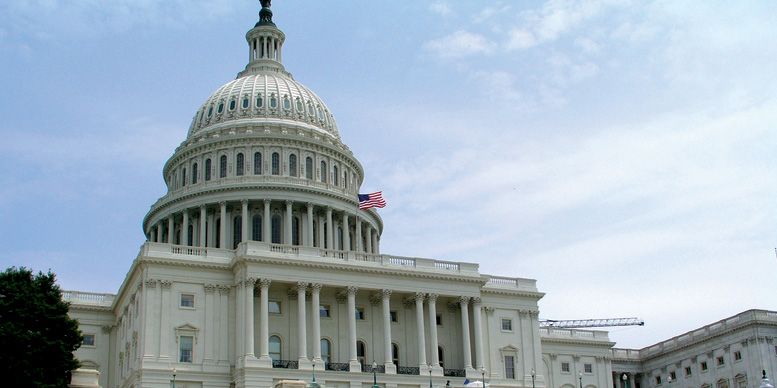If passed, the First Amendment Defense Act would have devastating implications for same-sex couples and the larger LGBTQ community.
By: Mike Givens/TRT Assistant Editor—
Eleven days after the historic Obergefell v. Hodges United States Supreme Court decision guaranteeing same-sex couples the right to marry, a polarizing video went viral on the internet and galvanized both proponents and opponents of marriage equality.
David Ermold and David Moore, a gay couple in Kentucky, posted a nearly 12-minute video of Rowan County Clerk Kim Davis refusing to issue a marriage license to the couple based on her religious beliefs. Davis garnered international attention and became the subject of intense debate. Martyrized by the religious right and demonized by progressives, Davis became a symbol for regressive ideas on the concept of marriage.
Facing jail time, a slew of court cases, heated opposition, and buoyant support from conservatives, Davis was eventually forced to begin issuing marriage licenses to same-sex couples.
However, with the election of Donald Trump as the next President of the United States, conservative lawmakers are renewing efforts to legislate the lives of same-sex couples through the introduction of the First Amendment Defense Act (FADA). If passed, the federal law would have devastating implications for same-sex couples and the larger LGBTQ community.
What is the FADA?
On June 17, 2015, more than a week before the Obergefell decision was handed down, two Republican congressmen introduced the FADA, which, “Prohibits the federal government from taking discriminatory action against a person on the basis that such person believes or acts in accordance with a religious belief or moral conviction that: (1) marriage is or should be recognized as the union of one man and one woman, or (2) sexual relations are properly reserved to such a marriage,” (https://goo.gl/k9S96v).
The legislation encompasses not only people, but also for and non-profit businesses and sceptics have argued that its language could be broadly defined and applied. Hard-won legal protections for LGBTQ people in employment, housing, education, public spaces, and even marriage rights could be attacked.
“The federal government may no longer require contractors to have fair employment practices vis-à-vis employees married to someone of the same sex; a hospital could bar patient visits from same-sex spouses; landlords could deny housing to married same-sex couples; employers could deny family medical leave to an employee who wants to care for an ill spouse of the same sex,” said Janson Wu, executive director of GLBTQ Advocates and Defenders (GLAD).
Pharmacies could refuse to fill prescriptions for birth control or HIV medications. Lesbian, gay, and bisexual employees could be fired from jobs, as well as unwed mothers. Restaurants, hotels, grocery stores, and banks could refuse service to same-sex couples. The ramifications of the bill’s passage would effectively unravel decades of civil rights for LGBTQ people.
“It could potentially have a large domino effect,” said Deborah Shields, executive director of MassEquality, a Boston-based LGBTQ advocacy organization. “It could have a fairly devastating impact.”
With “religious values” and “moral conviction” used to assert opinions about marriage and sexual relations, the law would leave the federal government powerless. Tax-exempt status could not be withheld from institutions that openly discriminate against LGBTQ people and the federal government would be banned from taking actions against any discriminatory institutions.
The law has 172 co-sponsors, but is still in its introductory stages. However, President-elect Trump has publicly declared his support for the bill should the Republican-controlled Congress push the legislation to his desk.
Religious Freedom in the States
According to the proposed law, “Nothing in this Act shall be construed to preempt State law, or repeal Federal law, that is equally or more protective of free exercise of religious beliefs and moral convictions. Nothing in this Act shall be construed to narrow the meaning or application of any State or Federal law protecting free exercise of religious beliefs and moral convictions. Nothing in this Act shall be construed to prevent the Federal Government from providing, either directly or through a person not seeking protection under this Act, any benefit or service authorized under Federal law.”
There are 22 states in the nation that have religious freedom laws. The clause states that if the laws in each state are stricter in terms of upholding religious freedom, then that state’s law supersedes FADA. States like Arkansas and Indiana have both passed controversial religious freedom bills.
“The bill is in its early stages of consideration, but the LGBTQ community needs to keep a close watch on this dangerous bill, and mobilize broadly to stop it,” said Wu.
Shields of MassEquality said that the individual religious freedom laws in states across the country could conflict with the FADA, if passed, and that the LGBTQ community needs to be proactive in ensuring the FADA’s failure in Congress.
“[There needs to be] lots of organizing and work with Congress and organizing people in their state to speak with their congressional representatives,” she said. “We’d have to find friendly republicans who will stand up against this and ensure that we have all the democrats on our side.”
With the election of Donald Trump as President and with Congress under conservative control, Shields admitted that the future could be bleak for LGBTQ people, but reflected that collectively, the community has experienced tremendous oppression, but has always been resilient.
“Our communities have been through really tough times before, but we will survive.”







